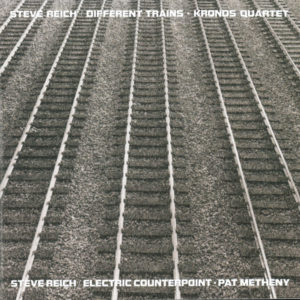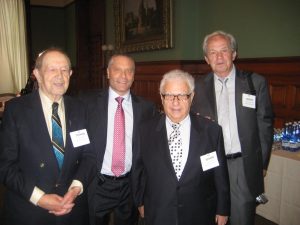Between 1939 and 1942, Steve Reich was a typical American kid. Well, perhaps aside from the fact that, from ages 3-6, he was taking train trips between New York and Los Angeles and back again. Reich’s father was a lawyer in Manhattan and his mother was trying to make it as a singer and lyricist in Hollywood. As a preschooler, he spent half the year with each parent. But the timing of the rides later took on a different resonance.

Different Trains, released as a collaboration with the Kronos Quartet in 1989, was Reich’s reflection of being shuttled across the country at the same time that Jews were being transported by Nazis during the Holocaust. The three movements integrate soundbites from people who experienced their own side of these stories. But amidst all the strings and rhythms and found sound—the pulse of the trains never fades away.
The methods behind the madness
Rolston String Quartet, a young ensemble based in Toronto, is taking on Different Trains by performing it in synch with a recent video interpretation by Spanish filmmaker Beatriz Caravaggio. Live players also need to weave through voices recorded by Reich: the governess who accompanied him on the trips, a retired Pullman porter who used to ride that cross-country route, and survivors of the concurrent Holocaust. Also, there’s the persistent sound of blaring sirens. What made this work most memorable, though, is the style employed by Reich throughout his varied composing career: tension through repetition. And then an unexpected swerve just before a listener starts thinking they can stand no more.
Where rap sampling got its start
“The great achievement of this work is that it makes the listener feel as if they were there, an actual witness to events,” says Lawrence Cherney, the artistic director of Soundstreams, the organization behind this performance. It follows a 30th anniversary reissue of Different Trains by Nonesuch Records. (It shared an album with Electric Counterpoint, for which Reich played with layers of jazz guitarist Pat Metheny.) The work was lauded as pinnacle for middle-aged Reich, even if his sonic collage approach was just beginning to touch the mainstream. Except hip-hop culture defined it as “sampling.”
READ: KLEZMER PROVIDES FRESH TAKE ON SILENT FILM
How this music got so Jewish
At 82, if Reich isn’t the world’s foremost living composer, he’s the foremost one who’s influenced by Judaism. After a secular Reform upbringing, he was drawn toward eastern religions through the 1960s, then explored Kabbalah. Professionally, he made his first waves for
using tape loops, then gradually started writing for ever-growing ensembles. But a yearning for more took him to the Lincoln Square Synagogue in New York. Not only did attending those Orthodox services inspire him personally, the prayers eventually reinvigorated his musical career – albeit through darker tones than before.
The influence of Biblical cantillation crept into Reich’s music through the 1970s; then he embraced the influence of the psalms heard in shul, for a 1981 work called Tehillim. Since the tradition of singing many of those psalms was all but lost, the composer considered them to be a canvas for his imagination, by incorporating the voices of four women amidst his signature traditions of repetition. Machinery of his earlier work yielded to a an organically mechanical approach to what he called “pulse music.” Reich later returned to leaning on technology. That is, aside from his unplugging for every Shabbat.
The rewards of Reich’s repetition
The staying power of Different Trains can’t be separated from its subject matter. “While we feel the horror of these events,” explains Cherney, “somehow Reich avoids both the sensationalism and the sentimentality that could’ve robbed this work of its raw power to remember the past.” A more direct experience arrived for him in 2001, when living four blocks away from the World Trade Center inspired him to compose WTC 9/11. The murder of journalist Daniel Pearl in 2002, by terrorists in Pakistan, was also the subject of a composition by Reich. There’s a lot to process from music about tragedy: even if you can only grasp so much by listening from a distance, there might be something in your life to compare them to. Sometimes, it’s simply a matter of having ridden a different train.
Different Trains will be presented by Soundstreams at the Trinity St. Paul’s Centre (429 Bloor St. W.) on Saturday,
Feb. 2 as part of a music program starting at 8 p.m., preceded by a chat hosted by Lawrence Cherney at 7:15 p.m.






